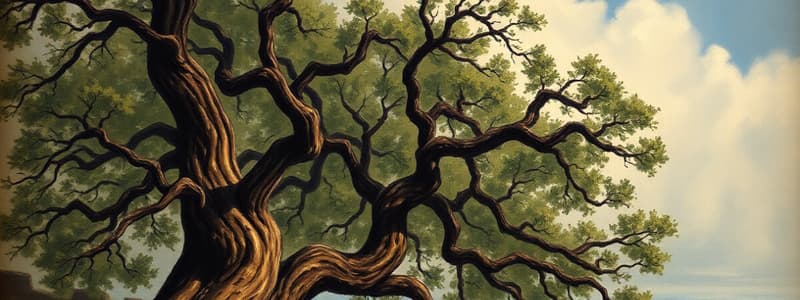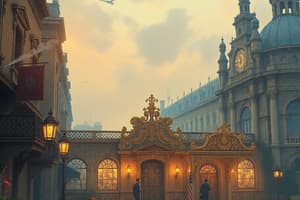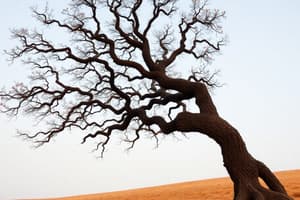Podcast
Questions and Answers
¿Qué carrera elige seguir Andrés Hurtado?
¿Qué carrera elige seguir Andrés Hurtado?
¿Qué opinión tiene Andrés sobre las clases que imparte el profesor Letamendi?
¿Qué opinión tiene Andrés sobre las clases que imparte el profesor Letamendi?
¿Cómo se presenta la universidad según la perspectiva de Andrés?
¿Cómo se presenta la universidad según la perspectiva de Andrés?
¿Qué figuras filosóficas considera Andrés en su estudio autodidacta?
¿Qué figuras filosóficas considera Andrés en su estudio autodidacta?
Signup and view all the answers
¿Qué relación tiene el amor con la narrativa de la novela?
¿Qué relación tiene el amor con la narrativa de la novela?
Signup and view all the answers
¿Cuál es el evento que genera la tristeza continua del personaje?
¿Cuál es el evento que genera la tristeza continua del personaje?
Signup and view all the answers
¿Cuál es la percepción de Andrés sobre el respeto que se brinda al conocimiento científico?
¿Cuál es la percepción de Andrés sobre el respeto que se brinda al conocimiento científico?
Signup and view all the answers
¿Qué periodo histórico se destaca por ser fundamental para el desarrollo científico?
¿Qué periodo histórico se destaca por ser fundamental para el desarrollo científico?
Signup and view all the answers
¿Qué actividad realiza el personaje durante sus estudios en medicina que refleja su curiosidad?
¿Qué actividad realiza el personaje durante sus estudios en medicina que refleja su curiosidad?
Signup and view all the answers
En la alegoría del árbol de la vida y el árbol de la ciencia, ¿qué representa el árbol de la vida?
En la alegoría del árbol de la vida y el árbol de la ciencia, ¿qué representa el árbol de la vida?
Signup and view all the answers
¿Qué aspecto se menciona como un motivo de veneración durante el siglo XIX?
¿Qué aspecto se menciona como un motivo de veneración durante el siglo XIX?
Signup and view all the answers
¿Cuál es el principal conflicto que enfrenta el personaje tras conocer la verdad?
¿Cuál es el principal conflicto que enfrenta el personaje tras conocer la verdad?
Signup and view all the answers
Según la alegoría, ¿qué ocurre a quienes comen del árbol de la ciencia?
Según la alegoría, ¿qué ocurre a quienes comen del árbol de la ciencia?
Signup and view all the answers
¿Cuál es la relación entre el árbol de la vida y el árbol de la ciencia?
¿Cuál es la relación entre el árbol de la vida y el árbol de la ciencia?
Signup and view all the answers
¿Qué filosofía se refleja en la decisión del personaje de terminar con su vida?
¿Qué filosofía se refleja en la decisión del personaje de terminar con su vida?
Signup and view all the answers
¿Qué sugiere la frase 'la ignorancia es un sinónimo de felicidad' en el contexto de la alegoría?
¿Qué sugiere la frase 'la ignorancia es un sinónimo de felicidad' en el contexto de la alegoría?
Signup and view all the answers
¿Cómo se describe a los estudiantes al asistir a las primeras clases de Medicina?
¿Cómo se describe a los estudiantes al asistir a las primeras clases de Medicina?
Signup and view all the answers
¿Qué comportamiento escandaloso realizan los estudiantes en clase?
¿Qué comportamiento escandaloso realizan los estudiantes en clase?
Signup and view all the answers
¿Cuál es una de las escenas grotescas mencionadas en la clase de Anatomía?
¿Cuál es una de las escenas grotescas mencionadas en la clase de Anatomía?
Signup and view all the answers
¿Dónde se ubica el pueblo ficticio de Alcolea del Campo?
¿Dónde se ubica el pueblo ficticio de Alcolea del Campo?
Signup and view all the answers
¿Qué técnica se utiliza para describir Alcolea del Campo?
¿Qué técnica se utiliza para describir Alcolea del Campo?
Signup and view all the answers
¿Qué tipo de clima se sugiere al describir el camino hacia Alcolea del Campo?
¿Qué tipo de clima se sugiere al describir el camino hacia Alcolea del Campo?
Signup and view all the answers
¿Qué imagen visual se evoca con respecto a los viñedos y olivos en la descripción del paisaje?
¿Qué imagen visual se evoca con respecto a los viñedos y olivos en la descripción del paisaje?
Signup and view all the answers
¿Qué elemento describe la atmósfera del aula durante las primeras lecciones de Medicina?
¿Qué elemento describe la atmósfera del aula durante las primeras lecciones de Medicina?
Signup and view all the answers
¿Cómo afectó la primera confesión a Andrés?
¿Cómo afectó la primera confesión a Andrés?
Signup and view all the answers
¿Qué relación tenía la madre de Andrés con la Iglesia?
¿Qué relación tenía la madre de Andrés con la Iglesia?
Signup and view all the answers
¿Cuál fue la reacción de Andrés al examen de Química que realizó?
¿Cuál fue la reacción de Andrés al examen de Química que realizó?
Signup and view all the answers
¿Qué consejo le dio el tío Iturrioz a Andrés sobre el estudio?
¿Qué consejo le dio el tío Iturrioz a Andrés sobre el estudio?
Signup and view all the answers
¿Qué sugiere el hecho de que Andrés aprobara el examen?
¿Qué sugiere el hecho de que Andrés aprobara el examen?
Signup and view all the answers
¿Qué se puede inferir sobre el carácter de Andrés a menudo?
¿Qué se puede inferir sobre el carácter de Andrés a menudo?
Signup and view all the answers
¿Qué aspecto se menciona como una característica negativa de los pueblos españoles en la decadencia del país?
¿Qué aspecto se menciona como una característica negativa de los pueblos españoles en la decadencia del país?
Signup and view all the answers
¿Qué sentimiento predominó en Andrés tras su primera confesión?
¿Qué sentimiento predominó en Andrés tras su primera confesión?
Signup and view all the answers
¿Cuál es una de las contradicciones en las que incurre Andrés?
¿Cuál es una de las contradicciones en las que incurre Andrés?
Signup and view all the answers
¿Cómo se percibe la universidad en el contexto de la España finisecular según la obra?
¿Cómo se percibe la universidad en el contexto de la España finisecular según la obra?
Signup and view all the answers
¿Cuál es el lugar recurrente donde los personajes debaten cuestiones filosóficas?
¿Cuál es el lugar recurrente donde los personajes debaten cuestiones filosóficas?
Signup and view all the answers
¿Qué ejemplifica la dificultad de llevarse a una mujer sin casarse según el texto?
¿Qué ejemplifica la dificultad de llevarse a una mujer sin casarse según el texto?
Signup and view all the answers
¿Cuál es una característica de los libros disponibles en la librería mencionada en el texto?
¿Cuál es una característica de los libros disponibles en la librería mencionada en el texto?
Signup and view all the answers
Según el texto, ¿qué se puede observar desde la azotea de Iturrioz?
Según el texto, ¿qué se puede observar desde la azotea de Iturrioz?
Signup and view all the answers
¿Cuál de las siguientes características se asocia con la sociedad española según el contenido?
¿Cuál de las siguientes características se asocia con la sociedad española según el contenido?
Signup and view all the answers
¿Cómo se siente Andrés al inicio de la novela respecto a sus estudios universitarios?
¿Cómo se siente Andrés al inicio de la novela respecto a sus estudios universitarios?
Signup and view all the answers
¿Qué crítica se hace a la figura del cura mencionado en el contenido?
¿Qué crítica se hace a la figura del cura mencionado en el contenido?
Signup and view all the answers
¿Qué ironía se presenta en las acciones de Andrés Hurtado?
¿Qué ironía se presenta en las acciones de Andrés Hurtado?
Signup and view all the answers
¿Cómo se describe la sociedad de Alcolea del Campo según Andrés?
¿Cómo se describe la sociedad de Alcolea del Campo según Andrés?
Signup and view all the answers
¿Qué postura toma Andrés respecto a los jóvenes republicanos?
¿Qué postura toma Andrés respecto a los jóvenes republicanos?
Signup and view all the answers
¿Qué indica la ironía verbal relacionada con el cura proxeneta?
¿Qué indica la ironía verbal relacionada con el cura proxeneta?
Signup and view all the answers
¿Cómo se percibe la imagen de los estudiantes madrileños en la novela?
¿Cómo se percibe la imagen de los estudiantes madrileños en la novela?
Signup and view all the answers
¿Qué papel juega la ironía situacional en el comportamiento de Andrés?
¿Qué papel juega la ironía situacional en el comportamiento de Andrés?
Signup and view all the answers
¿Qué representa la expresión 'ciencia evangélica completa' en relación al cura?
¿Qué representa la expresión 'ciencia evangélica completa' en relación al cura?
Signup and view all the answers
Flashcards
Supervivencia del más apto en el ámbito social
Supervivencia del más apto en el ámbito social
La idea de que la supervivencia se basa en la fuerza y el poder, como Darwin lo propuso en sus teorías de la evolución de las especies, se aplica al ámbito social.
El siglo XIX y la ciencia moderna
El siglo XIX y la ciencia moderna
El siglo XIX fue crucial para el desarrollo científico, sentando las bases para la ciencia moderna y generando descubrimientos que transformaron la sociedad.
Veneración por la ciencia
Veneración por la ciencia
La ciencia ganó un lugar de respeto y admiración, considerándosela la clave para el progreso y la salvación del ser humano.
Búsqueda de sentido en la ciencia
Búsqueda de sentido en la ciencia
Signup and view all the flashcards
Decepción y degradación de la ciencia
Decepción y degradación de la ciencia
Signup and view all the flashcards
La ciencia descuidada en España
La ciencia descuidada en España
Signup and view all the flashcards
Búsqueda del conocimiento en la filosofía
Búsqueda del conocimiento en la filosofía
Signup and view all the flashcards
El amor en la novela
El amor en la novela
Signup and view all the flashcards
El árbol de la vida
El árbol de la vida
Signup and view all the flashcards
El árbol de la ciencia
El árbol de la ciencia
Signup and view all the flashcards
La muerte en la novela
La muerte en la novela
Signup and view all the flashcards
La muerte de la madre
La muerte de la madre
Signup and view all the flashcards
La muerte del hermano
La muerte del hermano
Signup and view all the flashcards
Las muertes de la esposa y el hijo
Las muertes de la esposa y el hijo
Signup and view all the flashcards
El protagonista y la muerte
El protagonista y la muerte
Signup and view all the flashcards
La autopsia del personaje como médico
La autopsia del personaje como médico
Signup and view all the flashcards
La grosería y el atraso de los pueblos
La grosería y el atraso de los pueblos
Signup and view all the flashcards
La pornografía en las librerías
La pornografía en las librerías
Signup and view all the flashcards
La degradación de la universidad
La degradación de la universidad
Signup and view all the flashcards
Las expectativas de Andrés sobre la universidad
Las expectativas de Andrés sobre la universidad
Signup and view all the flashcards
La azotea de Iturrioz como símbolo de la filosofía
La azotea de Iturrioz como símbolo de la filosofía
Signup and view all the flashcards
La azotea como espacio de observación
La azotea como espacio de observación
Signup and view all the flashcards
La azotea como espacio de debate filosófico
La azotea como espacio de debate filosófico
Signup and view all the flashcards
Ironía verbal
Ironía verbal
Signup and view all the flashcards
Ironía situacional
Ironía situacional
Signup and view all the flashcards
Cura proxeneta
Cura proxeneta
Signup and view all the flashcards
Sociedad pasiva
Sociedad pasiva
Signup and view all the flashcards
Valores esperados de un cura
Valores esperados de un cura
Signup and view all the flashcards
Ciencia evangélica completa
Ciencia evangélica completa
Signup and view all the flashcards
Actitud de Andrés
Actitud de Andrés
Signup and view all the flashcards
Imagen de los estudiantes madrileños
Imagen de los estudiantes madrileños
Signup and view all the flashcards
Comparación teatro-clase
Comparación teatro-clase
Signup and view all the flashcards
Comportamiento escandaloso de los estudiantes
Comportamiento escandaloso de los estudiantes
Signup and view all the flashcards
Descripción grotesca de la clase de anatomía
Descripción grotesca de la clase de anatomía
Signup and view all the flashcards
Ubicación y descripción de Alcolea del Campo
Ubicación y descripción de Alcolea del Campo
Signup and view all the flashcards
Técnica impresionista
Técnica impresionista
Signup and view all the flashcards
Descripción del paisaje de Alcolea del Campo
Descripción del paisaje de Alcolea del Campo
Signup and view all the flashcards
Descripción sensorial
Descripción sensorial
Signup and view all the flashcards
Descripción de la diligencia
Descripción de la diligencia
Signup and view all the flashcards
La primera confesión de Andrés
La primera confesión de Andrés
Signup and view all the flashcards
El anticlericalismo de Andrés
El anticlericalismo de Andrés
Signup and view all the flashcards
El examen de química
El examen de química
Signup and view all the flashcards
La corrupción académica
La corrupción académica
Signup and view all the flashcards
La doble moral de Andrés
La doble moral de Andrés
Signup and view all the flashcards
La crítica a la educación
La crítica a la educación
Signup and view all the flashcards
Andrés: Dos caras
Andrés: Dos caras
Signup and view all the flashcards
La naturaleza crítica de Andrés
La naturaleza crítica de Andrés
Signup and view all the flashcards
Study Notes
Pío Baroja, El árbol de la ciencia
- Pío Baroja's El árbol de la ciencia is a notable contribution to the "Generation of '98," a literary movement characterized by its profound critique of Spanish society during a time of significant turmoil and transformation following the country's colonial losses.
- These Spanish writers extensively examined various aspects of Spanish social, political, and cultural issues, particularly focusing on the profound implications stemming from the loss of Spain's colonies in 1898. This loss not only resulted in a diminished national pride but also prompted deep introspection regarding Spain's identity, its role on the world stage, and the trajectory of its future. Such themes are intricately woven throughout the works of this generation, showcasing their critical perspective.
- The novel El árbol de la ciencia delves deeply into the author's existential and philosophical concerns, exploring themes such as the meaning of life, the search for knowledge, and the conflict between individual aspirations and societal expectations.
Argument and Structure
-
The novel is a Bildungsroman, focusing on the life of Andrés Hurtado.
-
It comprises seven parts: The Life of a Student in Madrid, The Canaries, Sorrow and Pain, InquisITIONS, The Experience in the Country, Experience in Madrid, and The Experience of the Son.
-
- Andrés, a dedicated medical student, embarks on a challenging and rigorous academic journey that is fraught with obstacles and arduous demands typical of the medical profession. He grapples with intense coursework, long hours in clinical rotations, and the emotional toll that accompanies dealing with patients in vulnerable situations. These various challenges culminate in profound moments of disillusionment, which are pivotal in his development. These setbacks not only highlight his academic pressures but also serve as a mirror to his internal struggles, reflecting his ongoing quest for self-identity and a deep-seated sense of purpose in a world filled with heavy expectations. As he navigates the increasing pressures exerted by his family, who have high hopes for his success, peers who are also vying for excellence, and the high-stakes academic environment, he becomes increasingly aware of the often unrealistic standards for success imposed by society. This acute awareness compels him to confront not only the harsh realities of life—such as failures and setbacks—but also the moral dilemmas and ethical considerations that accompany a career in medicine. These include difficult decisions regarding patient care, resource allocation, and the impact of systemic issues on health outcomes. Each of these experiences ultimately plays a crucial role in shaping his character and worldview, guiding him toward understanding that success is multifaceted and not solely defined by grades or accolades.
Characters and Themes
-
Andrés Hurtado: The protagonist, a young man navigating a complex and often disillusioning world. He displays a thirst for knowledge but encounters personal and societal obstacles and struggles to find meaning. He is shown to be a pessimistic character.
-
Lulú: A significant female character who inspires a great deal of reflection on love and societal expectations, and also the subject of important philosophical consideration.
-
Iturrioz: Andrés's uncle and mentor, represented as a knowledgeable figure who helps guide Andrés throughout his intellectual journey.
-
Themes:
- Existentialism: A recurrent theme throughout the narrative.
- Loss of meaning and purpose, especially in reference to the human condition.
- The search for meaning in a seemingly absurd world.
- Disillusionment with societal and political institutions.
- Love and relationships as sources of pain and struggle.
Additional Information
- Political and social context: The novel reflects on the social and political climate of Spain at the turn of the 20th century.
- Philosophy: The author explores philosophical concepts through conversations and reflections in the text.
- Character Types: Important secondary characters, like Julio Aracil and Montaner, also add significance to the narrative.
Studying That Suits You
Use AI to generate personalized quizzes and flashcards to suit your learning preferences.
Related Documents
Description
Descubre los temas y personajes de la novela 'El árbol de la ciencia' de Pío Baroja. Esta obra, emblemática de la Generación del 98, sigue la vida de Andrés Hurtado mientras navega por desilusiones personales y profesionales. Explora el contexto social y filosófico que rodea esta obra maestra de la literatura española.



